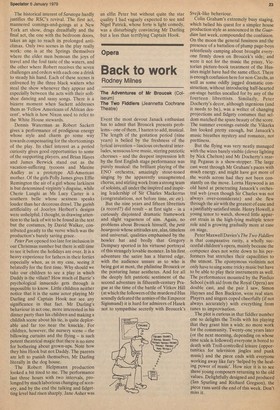Opera
Back to work
Rodney Milnes
The Adventures of Mr Broucek (Coliseum) The Two Fiddlers (Jeannetta Cochrane Theatre) Event the most devout Janack enthusiast has to admit that Broucek presents problems—one of them, I hasten to add, musical. The length of the gestation period (nine years) is belied by the freshness of the lyrical invention — luscious orchestral interludes, sensuous love music, stirring patriotic choruses — and the deepest impression left by the first English stage performance was purely musical: the brilliant playing of the ENO orchestra, amazingly stout-toned singing by the apparently unaugmented chorus, and stirling work from a strong team of soloists, all under the inspired and inspiring leadership of Sir Charles Mackerras (congratulations, not before time, etc etc).
But the nine years and fifteen librettists (a record?) did result — at first sight — in a curiously disjointed dramatic framework and slight vagueness of aim. Again, no problems about Broucek himself, the petit bourgeois whose attitudes are, alas, timeless and universal, qualities emphasised by the bowler hat and brolly that Gregory Dempsey sported in his virtuoso portrayal of this strangely lovable monster. In his first adventure the satire has a blurred edge, with the audience unsure as to who is being got at most, the philistine Broucek or the posturing lunar aesthetes. And for all the deeply felt patriotic sentiment of the second adventure in fifteenth-century Prague at the time of the battle of Vitkov Hill (at which the followers of the murdered Hus soundly defeated the armies of the Emperor Sigismund) it is hard for admirers of Hasek not to sympathise secretly with Broucek's Svejk-like behaviour.
Colin Graham's extremely busy staging, which belied his quest for a simpler house production style as announced in the Guardian last week, compounded the confusion. On the moon the general fussiness and the presence of a battalion of plump page-boys relentlessly camping about brought everyone firmly down on Broucek's side; and were it not for the music the prissy, Victorian picture-book treatment of the Hussites might have had the same effect. There is enough confusion here for non-Czechs, as well as some oddly jagged dramatic construction, without introducing half-hearted on-stage battles uncalled for by any of the fourteen librettists. Similarly, Peter Docherty's decor, although ingenious (and it needs to be), was a welter of changing projections and fidgety costumes that seldom matched the spare beauty of the score. The summer evenings outside the Vikarka Inn looked pretty enough, but Janacek's music breathes mystery and romance, not prettiness.
But the flying was very neatly managed with the wires barely visible (clever lighting by Nick Chelton) and Mr Docherty's rearing Pegasus is a show-stopper. The large cast went through Mr Graham's paces with much energy, and might have got more of the words across had they not been constantly on the move. Lorna Haywood is an old hand at penetrating Janacek's orchestral web (even though Sir Charles was not always over-considerate) and she flew through the air with the greatest of ease and a justifiably satisfied smile. Henry Howell, a young tenor to watch, showed little apparent strain in the high-lying multiple tenor role and is growing gradually more at ease on stage.
Peter Maxwell Davies's The Two Fiddlers is that comparative rarity, a wholly successful children's opera, mainly because the composer does not write down to his performers but stretches their capacilities to the utmost. The eponymous violinists not only have to sing some tricky music but have to be able to play their instruments as well. The performances mounted by the Pimlico School (with aid from the Royal Opera) are double cast, and the pair I saw, Simon Haynes and Ben Buckton, were real stars. Players and singers coped cheerfully (if not always accurately) with everything from tunes to improvisation.
The plot is curious in that fiddler number one so delights the Trolls with his playing that they grant him a wish: no more work for the community. Twenty-one years later (or the next morning, depending on whose time scale is followed) everyone is bored to death with Troll-controlled leisure (oppor tunities for television jingles and punk music) and the piece ends with everyone working away like fury 'helped by the heal ing power of music'. How nice it is to see these young composers returning to the old values. Delightfully designed and produced (Ian Spurling and Richard Gregson), the piece runs until the end of this week. Don't miss it.






























 Previous page
Previous page